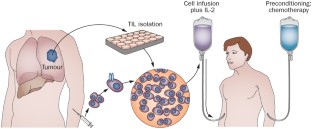Entering the mainstream of cancer treatment (original) (raw)
- News & Views
- Published: 14 October 2014
Decade in review—cancer immunotherapy
Nature Reviews Clinical Oncology volume 11, pages 630–632 (2014)Cite this article
- 7951 Accesses
- 11 Altmetric
- Metrics details
Subjects
By November 2004, when the first issue of Nature Reviews Clinical Oncology was published, cancer immunotherapy had been successfully applied to the treatment of selected human cancers; however, dramatic progress in the following decade has moved immunotherapy from the sidelines of cancer treatment into the mainstream of modern oncology.
This is a preview of subscription content, access via your institution
Relevant articles
Open Access articles citing this article.
Lysosome blockade induces divergent metabolic programs in macrophages and tumours for cancer immunotherapy
- Jing Ma
- , Ruijuan Ma
- … Songqiang Xie
Journal of Experimental & Clinical Cancer Research Open Access 04 August 2023
Why Probability isn’t Magic
- Fabio Rigat
Foundations of Science Open Access 01 September 2021
- Fabio Rigat
Detecting long-range interactions between migrating cells
- C. Metzner
- , F. Hörsch
- … B. Fabry
Scientific Reports Open Access 22 July 2021
Access options
Subscribe to this journal
Receive 12 print issues and online access
$209.00 per year
only $17.42 per issue
Buy this article
- Purchase on SpringerLink
- Instant access to full article PDF
Prices may be subject to local taxes which are calculated during checkout
Additional access options:
Figure 1: Adoptive cell transfer immunotherapy.

References
- Hodi, F. S. et al. Improved survival with ipilimumab in patients with metastatic melanoma. N. Engl. J. Med. 363, 711–723 (2010).
Article CAS Google Scholar - Topalian, S. L. et al. Safety, activity, and immune correlates of anti-PD-1 antibody in cancer. N. Engl. J. Med. 366, 2443–2454 (2012).
Article CAS Google Scholar - Brahmer, J. R. et al. Safety and activity of anti-PD-L1 antibody in patients with advanced cancer. N. Engl. J. Med. 366, 2455–2465 (2012).
Article CAS Google Scholar - Kantoff, P. W. et al. Sipuleucel-T immunotherapy for castration-resistant prostate cancer. N. Engl. J. Med. 363, 422 (2010).
Article Google Scholar - Rosenberg, S. A. et al. Durable complete responses in heavily pretreated patients with metastatic melanoma using T-cell transfer immunotherapy. Clin. Cancer Res. 17, 4550–4557 (2011).
Article CAS Google Scholar - Bollard, C. M. et al. Sustained complete responses in patients with lymphoma receiving autologous cytotoxic T lymphocytes targeting Epstein–Barr virus latent membrane proteins. J. Clin. Oncol. 32, 798–808 (2012).
Article Google Scholar - Morgan, R. A. et al. Cancer regression in patients after transfer of genetically engineered lymphocytes. Science 314, 126–129 (2013).
Article Google Scholar - Pule, M. A. et al. Virus-specific T cells engineered to coexpress tumor-specific receptors: persistence and antitumor activity in individuals with neuroblastoma. Nat. Med. 14, 1264–1270 (2008).
Article CAS Google Scholar - Kochenderfer, J. N. et al. Eradication of B-lineage cells and regression of lymphoma in a patient treated with autologous T cells genetically engineered to recognize CD19. Blood 116, 4099–4102 (2010).
Article CAS Google Scholar - Tran, E. et al. Cancer immunotherapy based on mutation-specific CD4+ T cells in a patient with epithelial cancer. Science 344, 641–645 (2014).
Article CAS Google Scholar
Author information
Authors and Affiliations
- National Cancer Institute, 10 Center Drive MSC 1201, Bethesda, 20892, MD, USA
Steven A. Rosenberg
Authors
- Steven A. Rosenberg
You can also search for this author inPubMed Google Scholar
Corresponding author
Correspondence toSteven A. Rosenberg.
Ethics declarations
Competing interests
The author declares no competing financial interests.
PowerPoint slides
Rights and permissions
About this article
Cite this article
Rosenberg, S. Entering the mainstream of cancer treatment.Nat Rev Clin Oncol 11, 630–632 (2014). https://doi.org/10.1038/nrclinonc.2014.174
- Published: 14 October 2014
- Issue Date: November 2014
- DOI: https://doi.org/10.1038/nrclinonc.2014.174